Quick Facts
- Parking and Launching:
- Rainbow Park
- Pay Parking $2/hour
- Closer to the start of River of Golden Dreams
- Lakeside Park
- 1.4km paddle on Alta Lake until you can reach the River
- Rainbow Park
- Launching type: dock and sandy beach
- Pullout: Meadow Park Sports Center
- Difficulty – intermediate, somewhat rapid flows in sections, hairpin turns, shallows, beaver dams
- Boat traffic – no motor boats, can be busy with paddlers and floaters on a weekend but generally you won’t see anyone else
- View – the vegetation covers most of the views even if you paddle standing up. High voltage power lines.
- Facilities: flush toilets at both parks
- Overall score – 6/10 (with options closer to Vancouver, I wouldn’t do the 2 hour drive for a day trip unless you want to check it off your list)
River of Golden Dreams in Whistler BC is a fun river to paddle on. The river flows northward starting from the northern end of Alta Lake, meanders through dense bushes, under some bridges, over many beaver dams which creates fun little rapids and obstacles, and eventually arrives at Green Lake. The best place to pull out if you just want to do the River is on a platform near the Meadow Park Sports Center. Parking here is free, with 3 hour maximum.
I would definitely recommend against paddling this river alone, and much better if you come with someone who had paddled here before. There are many places where accidents can happen, such as getting caught in a low bush, losing balance on a rapid river turn, puncturing an iSUP on a sharp branch, missing the exit platform etc. Besides, even if no accidents took place, it’s still easier to portage and get over obstacles if you have a partner.
If you don’t have an experienced paddle buddy to go with, you can book a guided canoe tour with one of the local companies in Whistler. Even if you don’t plan on booking a tour with them, it’s still a good idea to chat with them to get the up-to-date info on the river.
Also, it’s a good idea to put the leash on your PFD where you can easily reach and unleash yourself if you are trapped underwater (even better if you have a quick release leash). It also brings the leash higher off the board so that it’s less likely to be entangled.
Tina and I joined a guided canoe tour of River of Golden Dreams in August 2019 with Backroads Whistler because I didn’t want to go down a river for the first time without any guidance. It was a fantastic experience. Our guide explained to us that the River is fed by melting glacial water, so the water level changes quite predictably with the season. In late spring, the water can be very high and rapid, and in August the water can be so low that a paddler can get stuck on sand at multiple points. The best time to paddle the River is in the early summer months.







In 2020, I launched my paddleboard from Lakeside Park and tackled the River of Golden Dreams with a socially-distanced group of paddlers. We went in July, hoping to hit the sweet spot of water volume. It was somewhat cold and overcast, but the river was even more fun on a paddleboard than a canoe. The river gets quite narrow at several sections, with lots of logs and beaver dams to portage over. The water was freezing cold (remember: glacial melt), and the twists and turns of the river is accompanied by some fairly rapidly flowing water. All that adds up to a fairly challenging paddle with real hazards. An inflatable paddleboard could quite easily be punctured if one didn’t navigate a turn well enough, and ran into a log with sharp branches at speed. I was glad that I went with a group which came in handy on multiple occasions. I wouldn’t recommend paddling the river alone, nor with a toddler.






A good pullout location after paddling the River of Golden Dreams is at a small dock adjacent to the parking lot of Meadow Park Sports Centre. There is free 3-hour parking in this parking lot, which should be enough time for a paddle from Lakeside Park.

There is generally good cellphone reception throughout the river, but we still brought walkie-talkies for backup.

Paddle Report – July 16, 2021
I came to paddle the River on a SUP again with Tina. With many hours of paddling between last year to now, I have progressed from doing most of the river on my knees to staying standing unless I thought my fin would catch on an obstacle and throw me off.
Before we launched, I met a local canoe tour operator and got some good intel: the flow rate and water level were perfect. Just a few weeks ago there was a mandatory 600m portage due to high water levels that left no clearance under the BC Rail bridge, but now only a small fish weir required a 10m portage.
We first went to Lakeside Park, and found the parking lot closed due to construction. There was no indication on how long the lot would be closed for. We switched our launch spot to Rainbow Lake, but we hit a road block on Alta Lake Road approaching the lake from the south. Undeterred, we went to Alpine Way and approached the park from the north, and finally made it to our destination.
It was getting windy on Alta Lake, but it was blowing us north towards the river. Once we arrived on the river, the wind died right down.




We came upon the fish weir portage pretty quickly. We launched after the fish weir, but it did require getting our pants wet to get past 2 wooden logs.



The next section was quite narrow.

We came upon the confluence from the 21 Mile Creek, where the speed of the river increased significantly. The diagram shows this very well.

To avoid this section, or during high water levels, one can take out from the fish weir and follow the Valley Trail and portage route, to put in 600m later after the BC Rail Bridge. This is what we did on our canoe tour.
Since the water level was perfect, and I’ve done this section a few times already, we didn’t bypass this section. The video at the end of this post shows the rapids much better than these still photos.




After the fun 600m section, the remaining river followed a steady flow through many twists and turns. Each turn needs to be navigated carefully, as the water current can send you into the bushes if your turn is too wide, or the nose of your board may be caught on a sand bank and you could be turned around if your turn is too narrow.

There were also many beaver dams that creates fun obstacles that challenge your quick reaction and turning skills.



After the twists and turns, we arrived at Meadow Park. The bank is lined with big rocks. This serves as a good landmark because the pullout location is only another 200 meter away.

After paddling 5.5km for 1 hour and 45 minutes, we arrived at our pull out location. As the river flow remains steady here, it’s important to slow down and hug the left in order to not miss the pull out.




As a river to paddle through, the River of Golden Dreams is a lot of fun for an intermediate paddler. It’s definitely more challenging than the other rivers I’ve paddle on, such as Widgeon Creek and Nicomekl River, which are much more beginner friendly. With preparation and a good guide, though, most intermediate paddlers can enjoy the River of Golden Dreams too (probably mostly on their knees though). If in doubt, I would recommend considering bypassing the most rapid section from the fish weir to the BC Rail bridge.
Discover more from Outdoor Family
Subscribe to get the latest posts sent to your email.

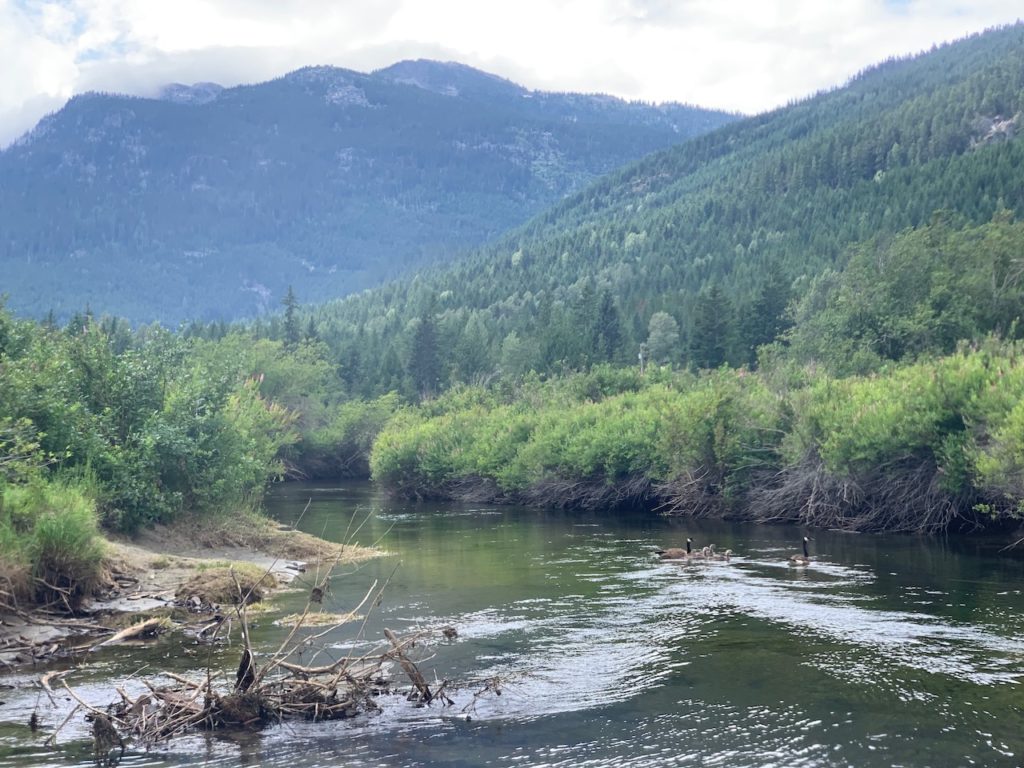
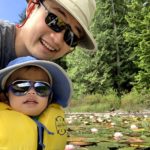
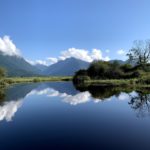
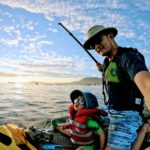
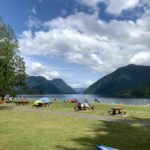
Pingback: Paddling Alouette River – Outdoor Family
Pingback: Alta Lake and River of Golden Dreams Paddles – Outdoor Family
Pingback: Squamish Estuary Paddle - Outdoor Family